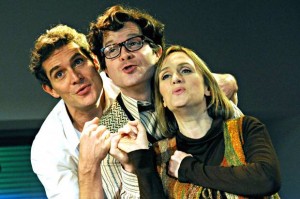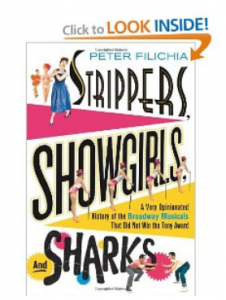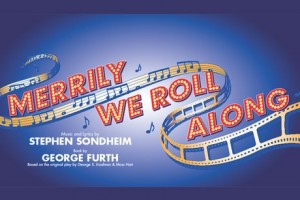Filichia Features: Merrily Indeed Rolls Along
Filichia Features: Merrily Indeed Rolls Along
On Oct. 23rd, more people saw the musical version of Merrily We Roll Along than at any time in its 32-year-history. No fewer than 465 cinemas around the nation were broadcasting the production that the Menier Chocolate Factory in London had mounted.
In 1981, would anyone have expected this from a show that closed on Broadway after 52 previews and 16 official performances? The failure was all the more surprising because the show was written by composer-lyricist Stephen Sondheim, bookwriter George Furth and directed by Harold Prince.![]()
But the decision to close was a savvy one, and not simply because a fight against the negative reviews would have meant throwing good money after bad. By saying “We know when we’re not wanted. We’ll go away,” the creators immediately created a Merrily mystique. Directors of musicals around the world were saying, “Let me see if I can fix it” – which has meant thousands of productions in nearly a third of a century.
Other directors have reluctantly chosen not to do Merrily because they see it as a great big Broadway show. But The Chocolate Factory isn’t much bigger than the average off-off Broadway theater, so director Maria Friedman miniaturized it – and came up with a potent reduction. So did set designer Soutra Gilmour, who provided a long narrow room whose back wall sported a few picture windows; to the left was a large cut-out of a circle that spun around on an unseen pole in the center.
The modest set worked because virtually every locale of Merrily is set indoors. Take Scene One in Franklin Shepard, Inc.’s posh Los Angeles home: the picture windows revealed a backdrop of the L.A. skyline while the cut-out circle sported some expensive artwork that Frank just thought he had to have. While the scene played, techies behind the wall were inserting the NBC-TV studio logo on the other side of the circle.
Scene Two’s TV locale had the picture windows reveal a workplace on which Frank’s soon-to-be-unfriended friend Charley Kringas would will have quite a workout, spurring their friend Mary Flynn to try to work things out between them. Scene Three took us to Frank’s New York apartment, where the Empire State Building was seen in the distance and a new piece of artwork filled the circle.
Ah, but Merrily veterans are already wondering about the next scene that takes place on the steps of the courthouse where Frank and first wife Beth have just finalized their divorce. While Friedman wasn’t entirely successful in establishing that the scene was taking place indoors, there’s no reason why it can’t entirely be played in a courthouse corridor. The circle, incidentally, became the seal of the Great State of New York.
After the Broadway failure, Sondheim and Furth rewrote and had Act Two begin at a performance of Shepard and Kringas’ Musical Husbands in which Gussie Josephson (the soon-to-be second Mrs. Franklin Shepard) sang “Good Thing Going.”
That’s about all that Sondheim and Furth specified, so most directors since then have just had Gussie sing in-one. Friedman decided that for at least this one scene Musical Husbands took place in Paris. So in front of a Moulin Rouge scrim, Gussie was surrounded by chorus boys with berets.
In other words, you have virtual carte blanche to make Musical Husbands into most anything you want it to be. You may set it in Greenwillow, Brigadoon or Sal Tlay Ka Siti, as long as Gussie sings “Good Thing Going.”
We returned indoors to Gussie and producer-husband Joe Josephson’s swank apartment to see Frank and Charley audition.(Here Damian Humbley gave an endearing smile after he sang the first line of “Good Thing Going,” showing the pride of knowing that he and Frank had written a good song.)
Then a tinseled curtain obscured the set and we were at the Upstairs at the Downtown Club. There Frank, Charley and Beth performed “Bobby and Jackie and Jack,” a piece of 1960-topical material that deals with the Kennedys.
Friedman was wise to include a large chart on which the Kennedys’ family tree detailed who was who. While 1981 wasn’t that long removed from the Kennedys heyday, the sad truth is that President Kennedy will soon have been out of office for a half-century. Some of the names aren’t familiar to younger audiences, so the family tree helped. Friedman also gave Frank, Charley and Beth fans upon which pictures of Bobby and Jackie and Jack were pasted.
Afterward, we returned to the main set on which Frank, Charley and Mary were situated in different areas. They were intent on “Opening Doors” that were currently closed and blocking their career success. The New York City skyline showed through the windows.
Alas, the set was still in place for the final scene which is supposed to take place on an open roof. Why Friedman retained the windows and circle remains a mystery. If the lighting had been virtually dark upstage and up on Frank, Charley and Mary way downstage, we would have understood. Directors who opt to do the show with Friedman’s template might consider flying out the back wall or at least removing it for this final scene.
Oh, well; nobody’s perfect – which is part of the message of Merrily. Where Friedman succeeded was directing her actors to show how difficult friendship and marriage are. “Why is it that old friends don’t want old friends to change?” Frank asks. It’s a good question, and a not unfair one. To quote a subsequent Sondheim show, “Sometimes people leave you halfway through the wood.”

We’re supposed to root for Frank’s first wife Beth, and yet she makes some demands on what Frank should do professionally and not do. (Luckily, Clare Foster didn’t make her seem venal.) We’re supposed to like Mary, but that’s awfully hard when we first meet her as an acerbic drunk. Jenna Russell’s was especially effective in the next scene, letting us see that she had been drinking, but not as out-of-control as we’d seen her earlier.
Or should we say later? Time to mention that Merrily rolls backwards in time. It makes for a bitter first act, but a very nice Act Two.
The atypical structure makes for some casting challenges. Some heavily criticized the original production for hiring young performers who couldn’t convincingly play characters who were supposed to be two decades older. Here, the 40-year-old Mark Umbers was fine in portraying the mature Frank. When he was asked to play younger, he tried valiantly by adopting uncertain posture; he bowed his head low when dealing with Gussie, too. It was the best he could do under the circumstances. The ideal production of Merrily might just be one in which young performers play the first act and older ones come on for Act Two.
Umbers did shine when he just had to sit and observe Charley’s tour-de-force “Franklin Shepard, Inc.” on national TV. Charley lets his long-simmering feelings about Frank and his work habits boil over to volcanic proportions, leading to an irrevocable break in both the long-standing friendship and the one-time successful collaboration.
So Umbers started out by playing amused, although he was NOT amused in the least. But he was on national TV, after all, and he had to at least pretend. Umbers gave the impression that Charley was going to end his rant in a sentence or two. Then as Charley continued, Umbers had to morph that false amusement into genuine astonishment when he realized that his “friend” was not going to stop any time soon, but would indict him for every artistic crime that he felt Frank had committed.
After that, Umbers’ face reflected the pain of “When will this end?” before turning to the fury of “When will this be over?” – all the while struggling to keep a convincing public face. Praising any production’s Charley for his “Franklin Shepard, Inc.” is almost always a given – and bless Damian Humbley for doing it splendidly -- but let’s have some huzzahs for Umbers, who could teach many Franks how to react during that long musical scene.
As Gussie, Josefina Gabrielle skillfully avoided Joe Josephson’s opening night kiss. The cliché has it that “the husband is always the last to know,” and perhaps Joe was -- but the script at least makes clear that he’s known for some time. Glyn Kerslake nicely had Joe pretend that Gussie and Frank would “get it out of their system.”
In fact, there was only one terrible performance, delivered by the actor who played the TV anchorman. Friedman obviously wanted to mock the unctuousness and pretentiousness of newscasters; this would be fine if the news he delivered were soft. But Furth wrote lines about Viet Nam and abortion, which are not subjects for comedy. Go easy on them.
Merrily is also a cautionary tale of how working in show business is murderously difficult. There’s potential danger when friends become collaborators. You’ve often heard “Don’t go into business with friends,” but that’s what Frank and Charley do, and both live to regret it. Notice that neither Frank nor Charley severs ties with Mary – probably because they never had to work with her. Things might have been different if they had.
Moral of the story: when you work with friends on Merrily We Roll Along, be careful. We want you all to stay good friends long after the closing night party.

You may e-mail Peter at pfilichia@aol.com. Check out his weekly column each Tuesday at www.masterworksbroadway.com and each Friday at www.kritzerland.com. His new book, Strippers, Showgirls, and Sharks – a Very Opinionated History of the Broadway Musicals That Did Not Win the Tony Award is now available at www.amazon.com.


























